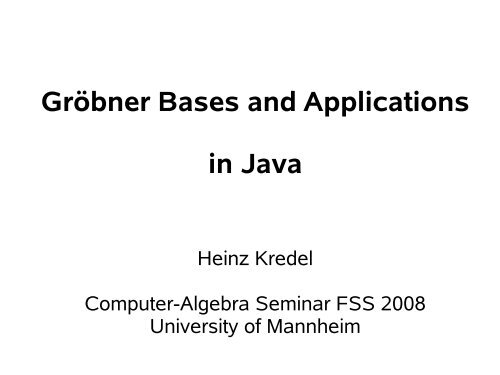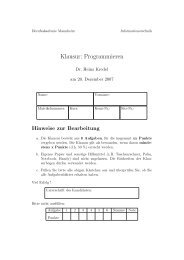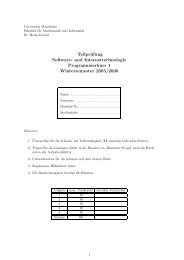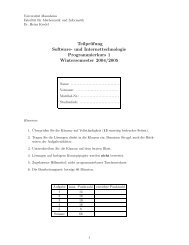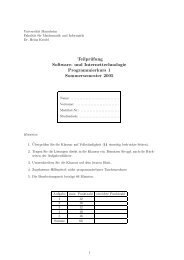Gröbner Bases and Applications in Java - KRUM Server
Gröbner Bases and Applications in Java - KRUM Server
Gröbner Bases and Applications in Java - KRUM Server
You also want an ePaper? Increase the reach of your titles
YUMPU automatically turns print PDFs into web optimized ePapers that Google loves.
<strong>Gröbner</strong> <strong>Bases</strong> <strong>and</strong> <strong>Applications</strong><br />
<strong>in</strong> <strong>Java</strong><br />
He<strong>in</strong>z Kredel<br />
Computer-Algebra Sem<strong>in</strong>ar FSS 2008<br />
University of Mannheim
Overview<br />
● Coefficients <strong>and</strong> Polynomials<br />
– Types <strong>and</strong> Classes<br />
– Functionality <strong>and</strong> Implementation<br />
– Examples <strong>and</strong> Performance<br />
● Polynomial Reduction<br />
● <strong>Gröbner</strong> <strong>Bases</strong> <strong>and</strong> Buchberger algorithm<br />
● <strong>Applications</strong><br />
– Ideals<br />
– Residue class r<strong>in</strong>gs
Introduction to software<br />
● object oriented design of a computer algebra<br />
system<br />
= software collection for symbolic (non-numeric)<br />
computations<br />
● type safe through <strong>Java</strong> generic types<br />
● thread safe, ready for multi-core CPUs<br />
● dynamic memory system with GC<br />
● 64-bit ready<br />
● jython (<strong>Java</strong> Python) front end
p ∈ R = C [ x 1 ,, x n]<br />
Polynomials<br />
2 4 5<br />
p = 3 x1 x 3 7 x 2 − 61 ∈ ℤ[ x1 , x 2 , x 3 ]<br />
● multivariate<br />
polynomials<br />
● polynomial r<strong>in</strong>g<br />
– <strong>in</strong> n variables<br />
– over a coefficient r<strong>in</strong>g<br />
● 3 variables<br />
x 1, x 2<strong>and</strong> x 3<br />
● with <strong>in</strong>teger coefficients
T Monoid , C R<strong>in</strong>g<br />
p : T C<br />
t pt =c t<br />
pt ≠0 for only f<strong>in</strong>itely many t ∈T<br />
pqt = pt q t <br />
p⋅qt =∑ u v=t pu⋅q v<br />
e1 en T = { x1 x n<br />
Monoid r<strong>in</strong>gs<br />
∣ e 1 ,... , e n ∈ ℕ n }<br />
C [ x 1,... , x n ] = { p ∣ p :T C }<br />
● polynomials as<br />
mapp<strong>in</strong>gs<br />
– from terms to<br />
coefficients<br />
– terms are power<br />
products of variables<br />
– with f<strong>in</strong>ite support<br />
– def<strong>in</strong>ition of sum <strong>and</strong><br />
product<br />
2 4 5 0 0 0 e1 e 2 e3 x1 x 3 3, x 2 7, x 1 x 2 x 3 −61 else x1 x2 x 3 0
Polynomials (cont.)<br />
0 0 0<br />
one : { x1 x 2<br />
x n<br />
1 }<br />
zero : { }<br />
2 4 5<br />
x1 x 3<br />
T x2 x j ∗ x i = c ij x i x j p ij<br />
1 i j n , 0 ≠ c ij ∈ C ,<br />
x i x j T p ij ∈ R<br />
● mapp<strong>in</strong>gs to zero are<br />
not stored<br />
● terms are ordered /<br />
sorted<br />
● polynomials with noncommutative<br />
multiplication<br />
● commutative is special<br />
case cij=1, pij=0
Type structure
R<strong>in</strong>g element creation<br />
● recursive type for coefficients <strong>and</strong><br />
polynomials<br />
● creation of ZERO <strong>and</strong> ONE needs<br />
<strong>in</strong>formation about the r<strong>in</strong>g<br />
● new C() not allowed <strong>in</strong> <strong>Java</strong>, C type<br />
parameter<br />
● solution with factory pattern: R<strong>in</strong>gFactory<br />
● factory has sufficient <strong>in</strong>formation for creation<br />
of r<strong>in</strong>g elements<br />
● eventually has references to other factories,<br />
e.g. for coefficients
R<strong>in</strong>g element functionality<br />
● C is type parameter<br />
● C sum(C S), C subtract(C S), C negate(),<br />
C abs()<br />
● C multiply(C s), C divide(C s), C<br />
rema<strong>in</strong>der(C s), C <strong>in</strong>verse()<br />
● boolean isZERO(), isONE(), isUnit(), <strong>in</strong>t<br />
signum()<br />
● equals(Object b), <strong>in</strong>t hashCode(), <strong>in</strong>t<br />
compareTo(C b)<br />
● C clone() versus C copy(C a)<br />
● Serializable <strong>in</strong>terface is implemented
R<strong>in</strong>g factory functionality<br />
● create 0 <strong>and</strong> 1<br />
– C getZERO(), C getONE()<br />
● C copy(C a)<br />
● embed <strong>in</strong>tegers C fromInteger(long a)<br />
– C fromInteger(java.math.BigInteger a)<br />
● r<strong>and</strong>om elements C r<strong>and</strong>om(<strong>in</strong>t n)<br />
● parse str<strong>in</strong>g representations<br />
– C parse(Str<strong>in</strong>g s), C parse(Reader r)<br />
● isCommutative(), isAssociative()
Polynomial types (1)
Coefficients<br />
● e.g. BigRational, BigInteger<br />
● implement both <strong>in</strong>terfaces<br />
● creation of rational number 2 from long 2:<br />
– new BigRational(2)<br />
– cfac.fromInteger(2)<br />
● creation of rational number 1/2 from two<br />
longs:<br />
– new BigRational(1,2)<br />
– cfac.parse( 1/2 )
Polynomials<br />
● GenPolynomial<br />
● C is coefficient type <strong>in</strong> the follow<strong>in</strong>g<br />
● implements R<strong>in</strong>gElem<br />
● factory is GenPolynomialR<strong>in</strong>g<br />
● implements<br />
R<strong>in</strong>gFactory<br />
● factory constructors require coefficient factory<br />
parameter
● types are<br />
Polynomial creation<br />
– GenPolynomial<br />
– GenPolynomialR<strong>in</strong>g<br />
● creation is<br />
– new GenPolynomialR<strong>in</strong>g(cfac,5)<br />
– pfac.getONE()<br />
– pfac.parse( 1 )<br />
● polynomials as coefficients<br />
– GenPolynomial<br />
– GenPolynomialR<strong>in</strong>g(pfac,3)
Class functionality (1)
Polynomial factory constructors<br />
● coefficient factory of the correspond<strong>in</strong>g type<br />
● number of variables<br />
● term order (optional)<br />
● names of the variables (optional)<br />
2 4 5<br />
x1 x 3<br />
T x2 ● GenPolynomialR<strong>in</strong>g( R<strong>in</strong>gFactory cf, <strong>in</strong>t n, TermOrder t, Str<strong>in</strong>g[]<br />
v)
Polynomial factory functionality<br />
● r<strong>in</strong>g factory methods plus more specific<br />
methods<br />
● GenPolynomial r<strong>and</strong>om(<strong>in</strong>t k,<br />
<strong>in</strong>t l, <strong>in</strong>t d, float q, R<strong>and</strong>om<br />
rnd)<br />
● embed <strong>and</strong> restrict polynomial r<strong>in</strong>g to r<strong>in</strong>g<br />
with more or less variables<br />
– GenPolynomialR<strong>in</strong>g extend(<strong>in</strong>t i)<br />
– GenPolynomialR<strong>in</strong>g contract(<strong>in</strong>t i)<br />
– GenPolynomialR<strong>in</strong>g reverse()<br />
● h<strong>and</strong>le term order adjustments
Polynomial functionality<br />
● r<strong>in</strong>g element methods plus more specific<br />
methods<br />
● constructors all require a polynomial factory<br />
– GenPolynomial(GenPolynomialR<strong>in</strong>g r, C c,<br />
ExpVector e)<br />
– GenPolynomial(GenPolynomialR<strong>in</strong>g r,<br />
SortedMap v)<br />
● access parts of polynomials<br />
– ExpVector lead<strong>in</strong>gExpVector()<br />
– C lead<strong>in</strong>gBaseCoefficient()<br />
– Map.Entry lead<strong>in</strong>gMonomial()<br />
● extend <strong>and</strong> contract polynomials
Example<br />
BigInteger z = new BigInteger();<br />
TermOrder to = new TermOrder();<br />
Str<strong>in</strong>g[] vars = new Str<strong>in</strong>g[] { "x1", "x2", "x3" };<br />
GenPolynomialR<strong>in</strong>g r<strong>in</strong>g<br />
= new GenPolynomialR<strong>in</strong>g(z,3,to,vars);<br />
GenPolynomial pol<br />
= r<strong>in</strong>g.parse( "3 x1^2 x3^4 + 7 x2^5 - 61" );<br />
toStr<strong>in</strong>g output:<br />
r<strong>in</strong>g = BigInteger(x1, x2, x3) IGRLEX<br />
pol = GenPolynomial[<br />
3 (4,0,2), 7 (0,5,0), -61 (0,0,0) ]<br />
pol = 3 x1^2 * x3^4 + 7 x2^5 - 61
Example (cont.)<br />
p1 = pol.subtract(pol);<br />
p2 = pol.multiply(pol);<br />
p1 = GenPolynomial[ ]<br />
p1 = 0<br />
p2 = 9 x1^4 * x3^8 + 42 x1^2 * x2^5 * x3^4<br />
+ 49 x2^10<br />
- 366 x1^2 * x3^4 - 854 x2^5 + 3721
Chebychev polynomials<br />
def<strong>in</strong>ed by recursion:<br />
T[0] = 1<br />
T[1] = x<br />
T[n] = 2 x T[n-1] - T[n-2]<br />
first 10 polynomials:<br />
T[0] = 1<br />
T[1] = x<br />
T[2] = 2 x^2 - 1<br />
T[3] = 4 x^3 - 3 x<br />
T[4] = 8 x^4 - 8 x^2 + 1<br />
T[5] = 16 x^5 - 20 x^3 + 5 x<br />
T[6] = 32 x^6 - 48 x^4 + 18 x^2 - 1<br />
T[7] = 64 x^7 - 112 x^5 + 56 x^3 - 7 x<br />
T[8] = 128 x^8 - 256 x^6 + 160 x^4 - 32 x^2 + 1<br />
T[9] = 256 x^9 - 576 x^7 + 432 x^5 - 120 x^3 + 9 x
Chebychev polynomial computation<br />
1. <strong>in</strong>t m = 10;<br />
2. BigInteger fac = new BigInteger();<br />
3. Str<strong>in</strong>g[] var = new Str<strong>in</strong>g[]{ "x" };<br />
4. GenPolynomialR<strong>in</strong>g r<strong>in</strong>g<br />
5. = new GenPolynomialR<strong>in</strong>g(fac,1,var);<br />
6. List T<br />
7. = new ArrayList(m);<br />
8. GenPolynomial t, one, x, x2;<br />
9. one = r<strong>in</strong>g.getONE();<br />
10. x = r<strong>in</strong>g.univariate(0); // polynomial <strong>in</strong> variable 0<br />
11. x2 = r<strong>in</strong>g.parse("2 x");<br />
12. T.add( one ); // T[0]<br />
13. T.add( x ); // T[1]<br />
14. for ( <strong>in</strong>t n = 2; n < m; n++ ) {<br />
15. t = x2.multiply( T.get(n-1) ).subtract( T.get(n-2) );<br />
16. T.add( t ); // T[n]<br />
17. }<br />
18. for ( <strong>in</strong>t n = 0; n < m; n++ ) {<br />
19. System.out.pr<strong>in</strong>tln("T["+n+"] = " + T.get(n) );<br />
20. }
Implementation<br />
● 160 classes <strong>and</strong> <strong>in</strong>terfaces<br />
● plus 80 JUnit test cases<br />
● JDK 1.5 with generic types<br />
● logg<strong>in</strong>g with Apache Log4j<br />
● some jython scripts<br />
● javadoc API documentation<br />
● revision control with subversion<br />
● build tool is Apache Ant<br />
● open source, license is GPL
Coefficient implementation<br />
● BigInteger based on<br />
java.math.BigInteger<br />
● implemented <strong>in</strong> pure <strong>Java</strong>, no GMP C-library<br />
● us<strong>in</strong>g adaptor pattern to implement R<strong>in</strong>gElem<br />
(<strong>and</strong> R<strong>in</strong>gFactory) <strong>in</strong>terface<br />
● about 10 to 15 times faster than the<br />
Modula-2 implementation SACI (<strong>in</strong> 2000)<br />
● other classes: BigRational, ModInteger,<br />
BigComplex, BigQuaternion <strong>and</strong> BigOctonion<br />
● AlgebraicNumber class can be used over<br />
BigRational or ModInteger
Polynomial implementation<br />
● are (ordered) maps from terms to coefficients<br />
● implemented with SortedMap <strong>in</strong>terface <strong>and</strong><br />
TreeMap class from <strong>Java</strong> collections<br />
framework<br />
● alternative implementation with Map <strong>and</strong><br />
L<strong>in</strong>kedHashMap, which preserves the<br />
<strong>in</strong>sertion order<br />
● but had <strong>in</strong>ferior performance<br />
● terms (the keys) are implemented by class<br />
ExpVector<br />
● coefficients implement R<strong>in</strong>gElem <strong>in</strong>terface
Polynomial implementation (cont.)<br />
● ExpVector is dense array of exponents (as<br />
long) of variables<br />
● sparse array, array of <strong>in</strong>t, Long not<br />
implemented<br />
● would like to have ExpVector<br />
● polynomials are <strong>in</strong>tended as immutable objects<br />
● object variables are f<strong>in</strong>al <strong>and</strong> the map is not<br />
modified after creation<br />
● eventually wrap with<br />
unmodifiableSortedMap()<br />
● avoids synchronization <strong>in</strong> multi threaded code
Performance<br />
● polynomial arithmetic performance:<br />
– performance of coefficient arithmetic<br />
● java.math.BigInteger <strong>in</strong> pure <strong>Java</strong>, faster than GMP<br />
style JNI C version<br />
– sorted map implementation<br />
● from <strong>Java</strong> collection classes with known efficient algorithms<br />
– exponent vector implementation<br />
● us<strong>in</strong>g long[], have to consider also <strong>in</strong>t[] or short[]<br />
● want ExpVector but generic types may not be<br />
elementary types<br />
– JAS comparable to general purpose CA systems but<br />
slower than specialized systems
compute q= p× p1<br />
p=1 x y z 20<br />
p=100000000011 x y z 20<br />
p=1 x 2147483647 y 2147483647 z 2147483647 20<br />
JAS: options, system JDK 1.5 JDK 1.6<br />
BigInteger, G 16.2 13.5<br />
BigInteger, L 12.9 10.8<br />
BigRational, L, s 9.9 9.0<br />
BigInteger, L, s 9.2 8.4<br />
BigInteger, L, big e, s 9.2 8.4<br />
BigInteger, L, big c 66.0 59.8<br />
BigInteger, L, big c, s 45.0 43.2<br />
Performance<br />
options, system time @2.7GHz<br />
MAS 1.00a, L, GC = 3.9 33.2<br />
S<strong>in</strong>gular 2-0-6, G 2.5<br />
S<strong>in</strong>gular, L 2.2<br />
S<strong>in</strong>gular, G, big c 12.9<br />
S<strong>in</strong>gular, L, big exp out of memory<br />
Maple 9.5 15.2 9.1<br />
Maple 9.5, big e 19.8 11.8<br />
Maple 9.5, big c 64.0 38.0<br />
Mathematica 5.2 22.8 13.6<br />
Mathematica 5.2, big e 30.9 18.4<br />
Mathematica 5.2, big c 30.6 18.2<br />
JAS, s 8.4 5.0<br />
JAS, big e, s 8.6 5.1<br />
JAS, big c, s 47.8 28.5<br />
Comput<strong>in</strong>g times <strong>in</strong> seconds on AMD 1.6 GHz or 2.7 GHz Intel XEON CPU.<br />
Options are: coefficient type, term order: G = graded, L = lexicographic,<br />
big c = us<strong>in</strong>g the big coefficients, big e = us<strong>in</strong>g the big exponents, s = server JVM.
Overview<br />
● Coefficients <strong>and</strong> Polynomials<br />
– Types <strong>and</strong> Classes<br />
– Functionality <strong>and</strong> Implementation<br />
– Examples <strong>and</strong> Performance<br />
● Polynomial Reduction<br />
● <strong>Gröbner</strong> <strong>Bases</strong> <strong>and</strong> Buchberger algorithm<br />
● <strong>Applications</strong><br />
– Ideals<br />
– Residue class r<strong>in</strong>gs
Term order<strong>in</strong>gs<br />
● (M,
Term order implementation<br />
● need comparators for<br />
SortedMap(Comparator)<br />
● generated from class TermOrder(INVLEX)<br />
● has methods<br />
– Comparator getDescendComparator()<br />
– Comparator getAscendComparator()<br />
● implemented all practically used orders<br />
– (<strong>in</strong>verse) lexicographical<br />
– (<strong>in</strong>verse) graded, i.e. total degree<br />
– def<strong>in</strong>ed by weight matrices<br />
– elim<strong>in</strong>ation orders (split or block orders)
Reduction<br />
● removal of terms <strong>in</strong> a polynomial by<br />
subtraction of multiples of a polynomial taken<br />
from a list of polynomials<br />
● extended reduction<br />
R=K [ x 1 ,... , x n] , f , g ,h∈R , F ⊂R ,a∈K ,t ∈T<br />
f g f ' , f '= f – a t g , LM a t g=m ∈ f<br />
f F h , f = f 0 g1 f 1 ... gk f k=h , g i∈F<br />
Lemma : f ' T f , h T f , k0<br />
f F h , f =∑ g∈F h g gh , for some h g∈R , g∈F
Reduction implementation
Implemented reductions
Overview<br />
● Coefficients <strong>and</strong> Polynomials<br />
– Types <strong>and</strong> Classes<br />
– Functionality <strong>and</strong> Implementation<br />
– Examples <strong>and</strong> Performance<br />
● Polynomial Reduction<br />
● <strong>Gröbner</strong> <strong>Bases</strong> <strong>and</strong> Buchberger algorithm<br />
● <strong>Applications</strong><br />
– Ideals<br />
– Residue class r<strong>in</strong>gs
<strong>Gröbner</strong> <strong>Bases</strong><br />
K field , R=K [ x 1 ,... , x n] , f , g∈R ,G⊂R ,a ,b∈K , s ,t ∈T<br />
Def<strong>in</strong>ition:G is<strong>Gröbner</strong> base iff id LM G=LM id G<br />
Theorem :G is <strong>Gröbner</strong> base iff ∀ f ∈id G f G 0<br />
Def<strong>in</strong>ition: Spol f , g=a t f −b s g , with LM a t f =LM b s g<br />
Theorem :G is <strong>Gröbner</strong> base iff ∀ f , g ∈G , f ≠g Spol f , g G 0
Buchberger algorithm<br />
algorithm: G = GB( F )<br />
<strong>in</strong>put: F a list of polynomials <strong>in</strong> R<br />
output: G a <strong>Gröbner</strong> Base of ideal(F)<br />
G = F<br />
B = { (f,g) | f, g <strong>in</strong> G, f != g }<br />
while B != {} do<br />
select <strong>and</strong> remove (f,g) from B<br />
s = Spol(f,g)<br />
h = normalform(G,s)<br />
if h != 0 then<br />
for f <strong>in</strong> G add (f,h) to B<br />
add h to G<br />
end<br />
end<br />
return G
<strong>Gröbner</strong> <strong>Bases</strong> implementation
Improved Buchberger algorithm<br />
● avoid reductions to zero if possible<br />
● Lemma<br />
● Proposition<br />
● Gebauer-Möller<br />
● Faugere: F4, F5<br />
LT f LTg = lcmLT f , LT g<br />
implies Spol f , g { f , g } 0<br />
if exists p with LT p ∣ lcmLT f ,LTg<br />
<strong>and</strong> Spol f , p0 <strong>and</strong> Spol p , g0<br />
then Spol f , g 0<br />
● Faugere, Gianni, Lazard, Mora: change of order<strong>in</strong>g
Tr<strong>in</strong>ks example<br />
Str<strong>in</strong>g exam = "Rat(B,S,T,Z,P,W) L "<br />
+ "( "<br />
+ "( 45 P + 35 S - 165 B - 36 ), "<br />
+ "( 35 P + 40 Z + 25 T - 27 S ), "<br />
+ "( 15 W + 25 S P + 30 Z - 18 T - 165 B**2 ), "<br />
+ "( - 9 W + 15 T P + 20 S Z ), "<br />
+ "( P W + 2 T Z - 11 B**3 ), "<br />
+ "( 99 W - 11 B S + 3 B**2 ), "<br />
+ "( B**2 + 33/50 B + 2673/10000 ) "<br />
+ ") ";<br />
Reader source = new Str<strong>in</strong>gReader( exam );<br />
GenPolynomialTokenizer parser = new GenPolynomialTokenizer( source );<br />
PolynomialList F;<br />
try {<br />
F = (PolynomialList) parser.nextPolynomialSet();<br />
} catch(ClassCastException e) {<br />
} catch(IOException e) {<br />
}<br />
GroebnerBase bb = new GroebnerBaseSeq();<br />
G = bb.GB(F.list);<br />
assertTrue("isGB( GB(Tr<strong>in</strong>ks7) )", bb.isGB(G) );<br />
PolynomialList t = new PolynomialList(F.r<strong>in</strong>g,G)<br />
System.out.pr<strong>in</strong>tln("G = " + t);
Tr<strong>in</strong>ks example <strong>in</strong> jython<br />
r = R<strong>in</strong>g( "Rat(B,S,T,Z,P,W) L" );<br />
pr<strong>in</strong>t "R<strong>in</strong>g: " + str(r); pr<strong>in</strong>t;<br />
ps = """<br />
(<br />
( 45 P + 35 S - 165 B - 36 ),<br />
( 35 P + 40 Z + 25 T - 27 S ),<br />
( 15 W + 25 S P + 30 Z - 18 T - 165 B**2 ),<br />
( - 9 W + 15 T P + 20 S Z ),<br />
( P W + 2 T Z - 11 B**3 ),<br />
( 99 W - 11 B S + 3 B**2 ),<br />
( 10000 B**2 + 6600 B + 2673 )<br />
)<br />
""";<br />
f = r.ideal( ps ); pr<strong>in</strong>t "Ideal: " + str(f); pr<strong>in</strong>t; #startLog();<br />
rg = f.GB(); pr<strong>in</strong>t "seq Output:", rg; pr<strong>in</strong>t;<br />
rg = f.parGB(2);<br />
f.distClient(); # starts <strong>in</strong> background<br />
rg = f.distGB(2);<br />
term<strong>in</strong>ate(); sys.exit();
Tr<strong>in</strong>ks example output<br />
Ideal: BigRational( B, S, T, Z, P, W ) INVLEX<br />
(<br />
( 10000 B^2 + 6600 B + 2673 ),<br />
( 45 P + 35 S - 165 B - 36 ),<br />
( 35 P + 40 Z + 25 T - 27 S ),<br />
( 15 W + 25 S * P + 30 Z - 18 T - 165 B^2 ),<br />
( -9 W + 15 T * P + 20 S * Z ),<br />
( 99 W - 11 B * S + 3 B^2 ),<br />
( P * W + 2 T * Z - 11 B^3 )<br />
)<br />
sequential executed <strong>in</strong> 131 ms<br />
seq Output: BigRational( B, S, T, Z, P, W ) INVLEX<br />
(<br />
( B^2 + 33/50 B + 2673/10000 ),<br />
( S - 5/2 B - 9/200 ),<br />
( T - 37/15 B + 27/250 ),<br />
( Z + 49/36 B + 1143/2000 ),<br />
( P - 31/18 B - 153/200 ),<br />
( W + 19/120 B + 1323/20000 )<br />
)<br />
parallel-new 2 executed <strong>in</strong> 184 ms<br />
distributed 2 executed <strong>in</strong> 1138 ms (131 ms start-up)
Parallel <strong>Gröbner</strong> bases<br />
● work queue of polynomials CriticalPairList<br />
● with synchronized methods get(), put(),<br />
removeNext() to modify data structure<br />
● scales well for 8 CPUs on a well structured<br />
problem (see next figures)<br />
● distributed version uses some k<strong>in</strong>d of a<br />
distributed list to store polynomials of set<br />
(implemented by a DHT)<br />
● use of object serialization for transport of<br />
polynomials over the network
Performance (parallel)
Implemented <strong>Gröbner</strong> <strong>Bases</strong>
<strong>Applications</strong> (1)<br />
● ideal membership test<br />
– proper ideal test<br />
● elim<strong>in</strong>ation ideals<br />
● <strong>in</strong>tersection of ideals<br />
R=K [ x 1 ,... , x n] , F , F 1, F 2⊂R , f ∈R<br />
f ∈id F ⇔ f G 0, G=GB F <br />
id F =R ⇔ 1∈id F ⇔ 1∈G , G=GB F <br />
X ={x 1 ,... , x n}, Y ={x i 1 ,... , x i k}⊂ X , Z= X ∖Y , Y ≪Z block order<br />
J =id F ∩K [Y ] ⇔ J =id G∩K [Y ] , G=GB F wrt Y ≪Z<br />
J =id F 1∩id F 2⇔ J =id G∩K [ X ] ,G=GBt F 11−t F 2 , X ≪t
<strong>Applications</strong> (2)<br />
● extended <strong>Gröbner</strong> base<br />
● syzygies<br />
G=GB F , want G={q gf }, F ={ p fq}, q gf , p fg∈R with<br />
g=∑ f ∈F q gf f <strong>and</strong> f =∑ g∈G p fg g for g∈G , f ∈F<br />
algorithm : G , G , F = extGB F <br />
syzygy f 1 ,... , f k: b=s 1 ,... , s k∈R k , with ∑ i=1,... ,k s i f i = 0<br />
b ij : a t g i−b s g j = Spol g i , g j = ∑ i=1,...k s i g i = 0<br />
B G = { b ij=s 1ij ,... , s kij ∣ Spol g i , g j G 0 }, B F = I − G F<br />
B G G
● ideal quotient<br />
● radical ideal<br />
<strong>Applications</strong> (3)<br />
J =id H , H , F⊂R , H ={h 1 ,... ,h m}<br />
quotient J : F = { g∈R ∣ g f ∈J for all f ∈F }<br />
proposition J : F = ∩ f ∈ F J : f<br />
S = syzygy f ,h 1 ,... , h m , Q = { q ∣ q ,q 1 ,... ,q m∈S }<br />
proposition id H : f = id Q<br />
radical J = { g∈R ∣ g s ∈J for some s∈ℕ }<br />
f ∈id F ⇔ id F∪{1−t f }∩K [ X ] ≠ ∅ , X ≪t
● residue classes<br />
<strong>Applications</strong> (4)<br />
● <strong>in</strong>tersection of residue classes, <strong>in</strong>terpolation<br />
● dimension of ideals<br />
G , F⊂R ,G=GBF <br />
A G = { h ∣ f G h , h irreducible , f ∈R }<br />
proposition A G represents residue classes mod id F <br />
h∈ A G is <strong>in</strong>vertible mod id F ⇔<br />
exists g , g 1 ,... , g k ∈R with h g∑ i=1,... , k g i f i=1<br />
test if 1∈G=GBF ' , F '={h}∪F , take g from extGBF '
Ideal class
Residue class class
Example<br />
List L = null;<br />
L = new ArrayList();<br />
BigRational bfac = new BigRational(1);<br />
GenPolynomialR<strong>in</strong>g pfac = null;<br />
pfac = new GenPolynomialR<strong>in</strong>g(bfac,1);<br />
List F = null;<br />
F = new ArrayList();<br />
GenPolynomial p = null;<br />
for ( <strong>in</strong>t i = 0; i < 3; i++) {<br />
p = pfac.r<strong>and</strong>om(5,5,5,0.4f);<br />
F.add(p);<br />
}<br />
//System.out.pr<strong>in</strong>tln("F = " + F);<br />
Ideal id = new Ideal(pfac,F);<br />
id.doGB();<br />
ResidueR<strong>in</strong>g rr = new ResidueR<strong>in</strong>g(id);<br />
System.out.pr<strong>in</strong>tln("rr = " + rr);
Example (cont.)<br />
Str<strong>in</strong>g[] vars = new Str<strong>in</strong>g[] { "a", "b" };<br />
GenPolynomialR<strong>in</strong>g fac;<br />
fac = new GenPolynomialR<strong>in</strong>g(rr,2,vars);<br />
GenPolynomial pp;<br />
for ( <strong>in</strong>t i = 0; i < 2; i++) {<br />
pp = fac.r<strong>and</strong>om(2,4,6,0.2f);<br />
if ( !pp.isConstant() ) {<br />
L.add(pp);<br />
}<br />
}<br />
System.out.pr<strong>in</strong>tln("L = " + L);<br />
GroebnerBase bb<br />
= new GroebnerBasePseudoSeq(rr);<br />
System.out.pr<strong>in</strong>tln("isGB(L) = " + bb.isGB(L));<br />
List G = null;<br />
G = bb.GB(L);<br />
System.out.pr<strong>in</strong>tln("G = " + G);<br />
System.out.pr<strong>in</strong>tln("isGB(G) = " + bb.isGB(G));<br />
ComputerThreads.term<strong>in</strong>ate();
Example (output)<br />
rr = ResidueR<strong>in</strong>g[ BigRational( x0, x1 ) IGRLEX<br />
(<br />
( x0^4 + 169/192 x0 + 13/152 ),<br />
( x1^4 - 22/15 x1 - 1/24 x0 - 63/22 )<br />
) ]<br />
L = [ { x0 + 24/31 } a^4 + a^3<br />
+ { x0^2 * x1^2 + x1^2 - 27/14 x0^2 + 75/8 x0 } ,<br />
a^2 * b^5 + { x1 + 30/17 } b^3 + { 2 } ]<br />
isGB(L) = false<br />
G = [ { x0 + 24/31 } a^4 + a^3<br />
+ { x0^2 * x1^2 + x1^2 - 27/14 x0^2 + 75/8 x0 },<br />
{ x0^2 * x1^2 + x1^2 - 27/14 x0^2 + 75/8 x0 } b^5<br />
+ { - x0 * x1 + 24/31 x1 + 30/17 x0 + 720/527 } a^2 * b^3<br />
+ { - x1 + 30/17 } a * b^3 + { - 2 x0 + 48/31 } a^2 - { 2 } a ]<br />
isGB(G) = true
Conclusions<br />
● consistent object oriented design <strong>and</strong><br />
implementation of a library for algebraic<br />
computations<br />
● <strong>Java</strong> advantages<br />
– generic types for type safety<br />
– multi-threaded, networked, 64-bit ready<br />
– dynamic memory management<br />
● benefits for computer algebra<br />
– non-trivial structures can be implemented<br />
– library can be used from any <strong>Java</strong> program
● Questions?<br />
● Comments?<br />
Thank you<br />
● http://krum.rz.uni-mannheim.de/jas<br />
● http://krum.rz.uni-mannheim.de/kredel/ca-sem-2008.pdf<br />
● Thanks to<br />
– Thomas Becker<br />
– Aki Yoshida<br />
– Raphael Jolly<br />
– many others


